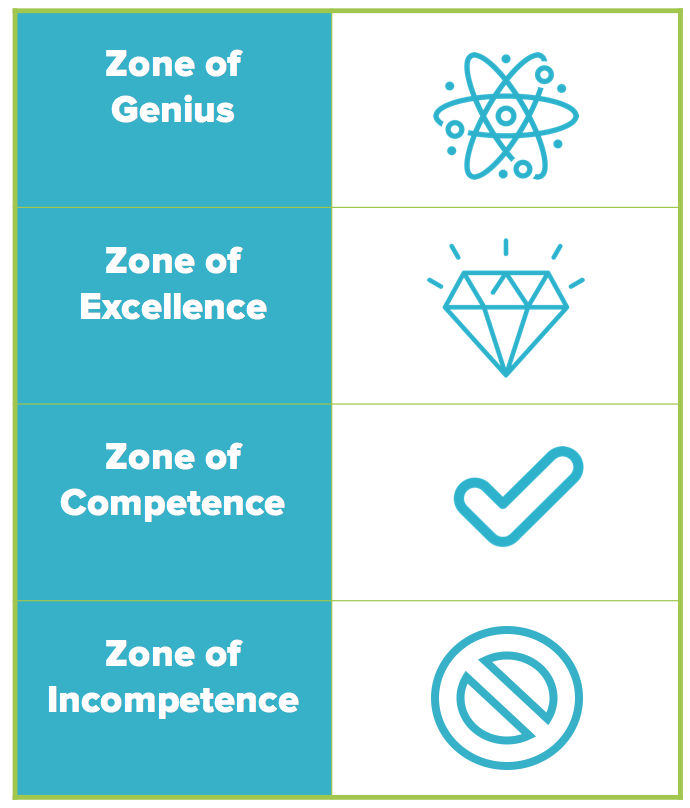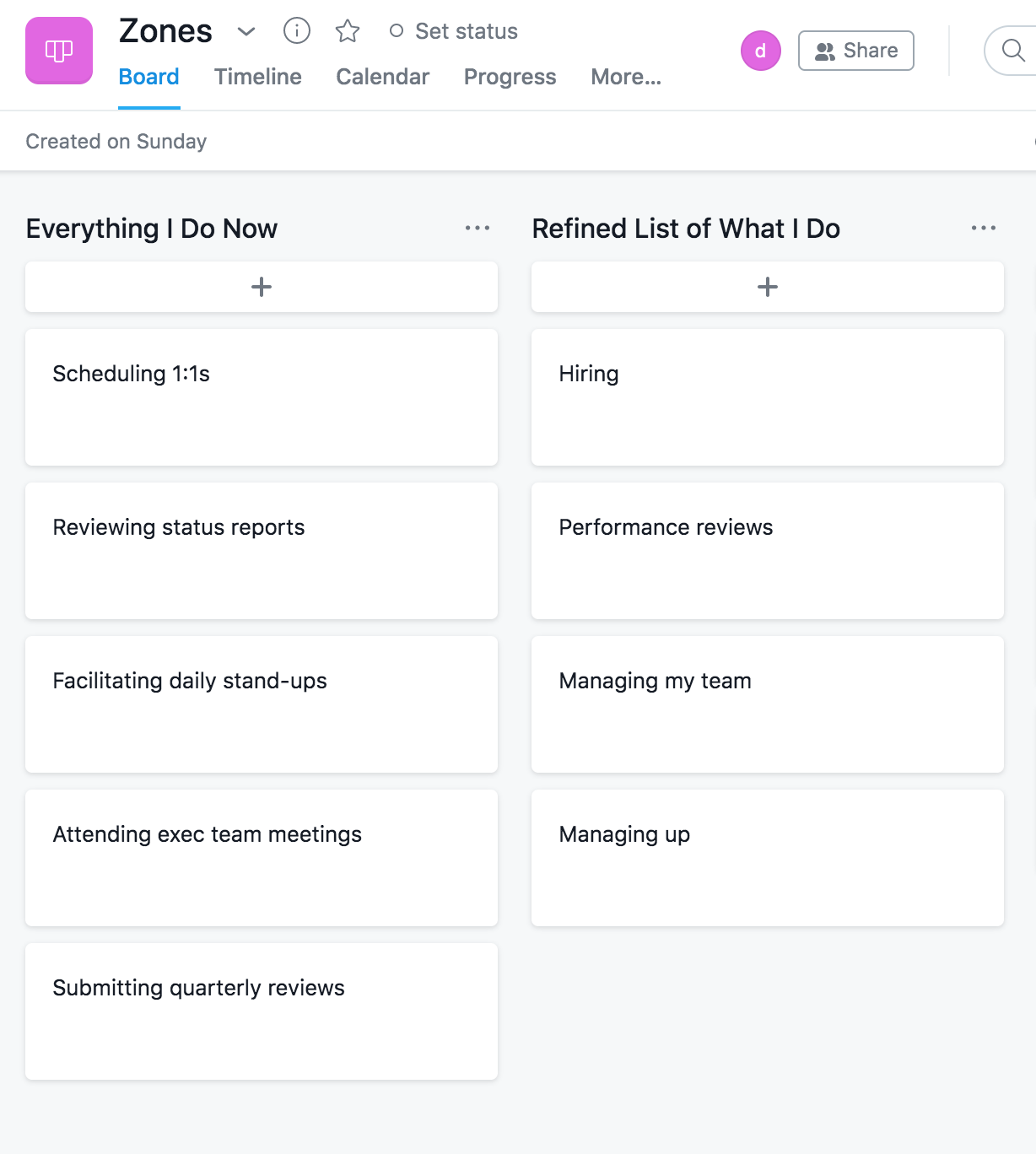A Practical Application of Zone of Genius to Your Job: Find Out Which Zone You Work in Most
In Conscious Leadership, we articulate the notion of “Zone of Genius,” part of a conceptual model that includes Zone of Excellence, Zone of Competence, and Zone of Incompetence. Conscious leaders want to first identify areas of genius and then find opportunities to lean into genius in work and in life. They want to do the same thing for their team members.
The concept of genius comes first from Gay Hendricks’ book The Big Leap. My teachers expanded on this concept in the book The 15 Commitments of Conscious Leadership. We include the model of zone of genius in our eight choices of Conscious Leadership.
The zone of genius is one of four zones that comprise this model:

First, one’s zone of incompetence represents things we are not very good at. For me, this is plumbing and electrical. If I invite you to a home for which I’ve managed the electrical, bring a candle. Most of you reading this piece are high-performing leaders and individual contributors. You are rarely in your zone of incompetence. However, in a very early-stage startup, you might find yourself there — hopefully not doing the plumbing, but almost certainly picking up and learning tasks as a beginner while your company gets its early bearings.
Next, is your zone of competence. This is a far more common spot for early companies and cash-strapped non-profits. It might also be a zone you’re in at home if you’re saving money or paying down student loans. A zone of competence for me is cleaning my bathroom. I was a hotel housekeeper in college for a time, so I’m not half bad at this. Still, at this point, I choose to outsource that effort to a cleaning service.
Next is your zone of excellence. These are things you do (or ways that you are) at which you truly excel. If you’re working for a larger company, which has had a greater opportunity to get the right people in the right seats, you’re likely getting plenty of opportunities to be excellent. When you’re in your zone of excellence, you’ll earn promotions and awards. You’ll be recruited to bigger and “better” roles. Most professionals top out in their zone of excellence. The praise is reassuring; we’ve mastered these areas of focus. So it’s positive and comfortable at the same time.
I think a zone of excellence activity for me is teaching college courses. I’ve done it. The students seem to enjoy the courses I teach. But I notice that preparing to teach doesn’t excite me as much as my work as an investor or a Conscious Leadership coach. Moreover, I’ve seen college professors for whom teaching is a pure zone of genius. If you get a chance, go to the University of Colorado Law School and take the Venture Capital course with Brad Bernthal and Jason Mendelson. That is genius.
Just when you think you’ve got things completely wired, Conscious Leadership offers you the next edge for your personal growth: Zone of genius. When you are in your zone of genius, you are doing something or being a way that feels easy and joyful. You are not only excellent at doing the thing, but when you do the thing, it feels effortless. Time falls away. Being in one’s zone of genius offers access to one’s full potential and maximum creativity. For me, serving as the Master of Ceremonies for awards shows is, I believe, in my zone of genius. I love the chance to engage the audience; I love celebrating the award recipients; I love the real-time opportunities to be funny (my story) in reaction to things that happen in multi-guest events like this, and I love surprising the awardees with fun facts I’ve learned about them in stealth mode.
As I’ve mentioned, there are all manner of reasons to not live in our zone of genius. We may believe it’s not possible. We may feel it’s risky to give up a job in our zone of excellence. We may believe that it’s financially impossible to live and live in our zone of genius. These types of protest represent a familiar concept in Conscious Leadership. Our friends at the Conscious Leadership Group talk about this as an unwillingness to live in our genius.
Now, how can you determine your zone of genius? First, we love “The Best Stuff” exercise, based on the work of Jim Warner and Kaley Klemp. This exercise encourages you to identify common threads across memorable accomplishments or experiences in your life. These threads point to your unique gifts.
To lean into our genius, we then ask how we might apply those gifts to our careers. You might have a direct report who says a zone of genius for him is fly fishing. If you’re his manager, you might not be positioned to create a “Director of Fishing” role. However, you might consider qualities that are common to fly fishing fans — patience, attention to detail, solitude, and craftsmanship, for example. Once you (and he) have done that, you might and explore how he might apply those qualities in his current role.
I’ve been coaching executives in transition, and I wanted to create a follow-on activity for these clients. The idea was to create a pragmatic way to explore genius in relation to their day-to-day job. I call this your Zones of Capability Inventory.
Here’s what you do.
I like using a spreadsheet for this, but the “board” feature in Asana, Trello, or Airtable will work too. I created a spreadsheet template here. Here is an example of the board structure:

First, create Column 1: “Everything I Do Now”
Write in column 1 every single thing you do in your job. Make this an exhaustive data dump with one task or focus area per row. For example, include different things you do to “manage up,” “attending all-hands meetings,” “relating with other leaders,” “emptying the dishwasher.” Don’t worry about overlap or whether an entry is “important.” Just open the floodgates here. This is a 1,000-foot view of what you do.
Second, create Column 2: “A Refined List of What I Do”
Next, refine column 1 by blending similar tasks into a 5,000-foot description of a thing. A good example is “managing up.” Don’t go to 20,000 feet; we don’t want to get too abstract here. Make column 2 a distilled list of things you do and roles you play.
Third, create Column 3: Examples of What I Do
In column 3, write down three mini-moments or stories of you doing that thing in recent history where you’ve felt a feeling — either positive or negative. Limit these examples to the last two years.
In a board, you might put the three examples inside column 2 as a description, as I’ve done below.

Fourth, review the items in Column 2 and the examples of those items in Column 3.
Do this with time and patience. This is a nice weekend activity. Read the little moments and stories you jotted down. Put yourself in the mindset of that thing you do. Feel the feeling of that thing in column 2 in the context of your examples. Add or subtract examples if something better comes up.
Next, having reviewed your item in column 2 and the examples in column 3, ask yourself one column 2 entry at a time: “in which ‘zone’ does this thing live for me?” Is it my zone of incompetence, competence, excellence, or genius.
Finally, create Column 4: G, E, C, I for each of the above zones.
Then, in column 4, indicate the zone in which that thing lives.
Then look at your final four columns. Ask yourself some questions:
- What thoughts, stories, or conclusions arise as you reflect on the weight of things in different columns?
- What do you notice about the distinction between things in your zone of excellence and zone of genius?
- How much are you doing in zones of competence and incompetence? What are the controlling stories for why that’s occurring right now?
- Do you “want” to lean more into items in your zone of genius in your current or next role? Are you “willing” to?
This exercise takes some real work, but I created it to help you see through the noise of habit, external validation, and comfort zones. When my clients ask me for help in a search for a new role or in finding more aliveness in a current role, this is my new go-to move. Here’s a spreadsheet template you can use to get started.
Let me know how it goes for you!
